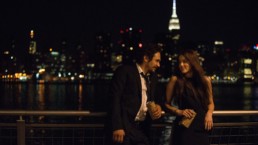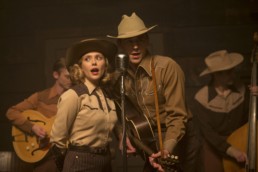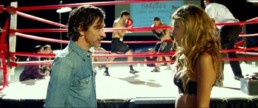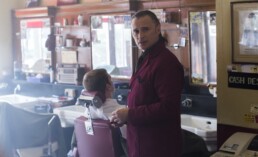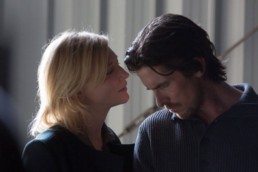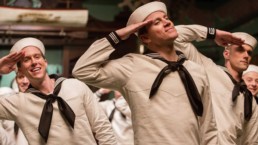'The Jungle Book': Animation for a New Generation
It's a weird thing, to be old enough to feel nostalgia for one's own childhood. As the first wave of this millennial generation, and a child of the 90s, I am part of the last generation of people to have watched our movies on VHS cassette. One of those movies amongst a collection of other classic Disney animated films, is the 1967 version of, The Jungle Book.
Thirty-nine years ago a hand-drawn masterpiece debuted (the last animated film that Walt Disney personally oversaw before passing away), I find myself at the famed El Capitan Theatre in Hollywood, waiting for this new update to begin. As a critic amongst critic peers, sitting in a mostly family-and-kids packed screening, I put on my 3-D glasses, and after seeing the opening, iconic, Disney castle and logo fill the screen, we are all one theatre, pulled into a truly amazing, fully digitally animated world that is the Jungle Book for a new generation.
This year's remake of the same name, The Jungle Book brings to the screen the same heart-warming story as the 1967 version, but in dazzling and brilliantly rendered CGI animation (parents, don't fear that this new remake is following the trend of "darker" films – save that for 2018's Warner Brothers version of the remake, simply titled, Jungle Book). The marketing promotes that this film is brought to us "from the Studio that gave us Pirates of the Caribbean," which smartly reminds us that they know how to adapt rollercoaster ride-to-movie experience. Upon dissolving from the Disney logo, the camera glides and flies, twists and turns, over and under vines and tree branches in ride-like manner, as we follow digitally animated wolves and animals scaling the jungle, as well as our protagonist and our young man-cub.
https://www.youtube.com/watch?v=C4qgAaxB_pc
Mowgli, played by newcomer Neel Sethi, is the only human onscreen for the entirety of the movie (again, this film should technically be considered an animated film), and gives the sort of school-play performance. Our young Mowgli, swathed in the same red trunk undergarment, is surrounded by the familiar animal friends we all know and love as part of the Jungle Book-lore – and who are all cast perfectly. As Mowgli's protective panther Bagheera, who finds and watches over the young child, Ben Kingsley is strong and eloquent with his English dialect, narrating our way in to this new world. As the threatening and snarling tiger Shere Kahn, fellow Brit Idris Elba (Beasts of No Nation), whose voice you may recognize from the other Disney hit Zootopia, provides the voice of the villain whose distrust of the man-cub sets the story in motion, claiming the young boy is a threat to all of the animal kingdom, vowing to hunt him down to remove him – permanently – from the jungle.
When young Mowgli decides, for the betterment of his family and the rest of the jungle, to leave his wolf family behind, including his mother Raksha (Lupita Nyong'o, Star Wars: The Force Awakens) and father Akela (Giancarlo Esposito, Breaking Bad), he meets the rest of the iconic Jungle Book characters. Credit the film for understanding and playing to all of the characters (and actors) strengths, for the movie blossoms anew in fun in the second act when a lone Mowgli meets his bear pal Baloo, the ever-hilarious Bill Murray.
Murray as Baloo is a delight, and from this point forward, it felt as though the older-aged skewing audience took equal-to-more delight in seeing the lovable bear crack so casually wise as only Murray can. And yes, the iconic songs make the cut here, (Murray's splashy rendition of "The Bare Necessities" feels like it was performed by Disneyland's very own New Orleans Square jazz band) but in good restraint. The movie weaves the songs naturally into the story that's in place, meaning no show-stopping musical numbers here, but that serves the feeling of being a movie all the same. This extends to the other Jungle Book hit "I Wanna Be Like You," sung by the legendary Christopher Walken, as King Louie gets a massive wide-eyed character redesign akin to a slightly more friendly King Kong – slightly.
The Jungle Book is the latest Disney movie from their animated masterpiece canon to get a "live-action" remake (after Cinderella, and look for the recently announced Emily Blunt-starring Mary Poppins). It's a through and through adaptation, almost exact copy and paste of the hand-drawn version, and yet it still feels plumb new, every moment of it captivating and eliciting childlike wonder from all. Director Jon Favreau (Iron Man) whips up a new animated experience for a new generation of kids. Your kids' kids adaptation will most likely be the Virtual-Reality experience, but for now, the film impresses with its use of digital animation, along with the magic that made it so great – those simple, bare necessities.
105 minutes. Rated PG for some sequences of scary action and peril. Now playing everywhere.
'The Adderall Diaries' Is Too Dependent on Its Own Stilted Throes of Pain
"Hurt people hurt people," so the saying goes, and nowhere is that sentiment more deliberately chewed over than in the new memoir-turned-movie, The Adderall Diaries. Like its name sounds, The Adderall Diaries only amounts to be a scattered and disjointed series of high-strung story lines and emotions, not feeling so much individually distinguished as it does overly stuffed.
Based on the best-selling memoir by Stephen Elliott, meta celebrity James Franco plays the aforementioned author, a hotshot young New York novelist (who just happens to have the same cool guy look and swagger of a Franco type, right down to the trademark scruffy facial hair and leather jacket). Franco gets to indulge all of his persona's pleasures here, seeing our main character Stephen writing pages of prose (the film uses cuts of typed passages from the memoir to further blend book-to-movie adaptation) on his laptop in his swanky New York high-rise apartment, signing books at book signings and reading passages at book readings, and generally, living the good life.
With life seemingly worry-free, and needing to decide a next book project to pursue (much to the pressure from his manager, played by Cynthia Nixon), Stephen decides to attend a court hearing of a father (Christian Slater) accused of abusing his kids murdering his wife, making Stephen reflect on his own intensely traumatic and abused past, which is when his world come crashing down. Or, no – it's when he meets an attractive young writer in Lana Edmond (Amber Heard) who shares a similarly troubled childhood as an also-victim of abuse (and who also has dark and mysterious body tattoos as a result of it). Wait, no – it's when his father, Neil Elliott (Ed Harris), the man Stephen holds responsible for abusing and neglecting him, comes into town, does it all come crashing down. Not to put too fine a point on it, but there's a mish-mash of things going on here that all kind of start and stop in a herky-jerky way.
https://www.youtube.com/watch?v=_qVMu-qnuNg
Perhaps in The Adderall Diaries' original memoir form, the many number of Stephen's side-stories might have woven together in a lighter, more graceful way, rather than feeling as equally competing against each other as they do here. To its credit, the film does attempt to stitch scenes together with a degree of dreamlike qualities and synthy-spaciousness to illicit this lyrical feeling, its sonic space similar to 2014's novel-to-movie, White Bird in a Blizzard. But the forced accumulation of all these things – including a bout of writer's block that relapses Elliott into taking adderall and pills again – feel's like a relentless downpour of self-pity and vanity.
The writing and directing effort here from Pamela Romanowsky (2012's The Color of Time) feels contrived, and so submissive to Franco's star power that it ultimately buckles under artificiality. For any, and certainly, for all of this to stick, Elliott the character needs to be a man we can truly know, and whose vulnerability can be felt and understood by all. Franco's leather jacket, bad boy with daddy issues character, doesn't so much create the character from the book as it does get absorbed into his own persona.
The Adderall Diaries posits spurts of a larger, more interesting idea – that being the connection of memory, and who we think we are and who we see others as from the recollection of past experiences. The movie's further exploration into broken pasts and the people trying to reconcile that with their present situations is something that should've offered a much more universal feeling of catharsis and understanding, rather than with a heavy helping of self-pitying and brooding. Interestingly, the real-life Stephen Elliott even felt the need to explain the differences between his actual life and writing after having seen The Adderall Diaries, which can only speak to the fact that sometimes, full justice might not be served in the pursuit of claiming "artistic liberties."
105 min. Rated R for language throughout, drug use, sexuality, and some aberrant and disturbing content. 'The Adderall Diaries' is currently available exclusively on DirecTV; It will be released theatrically and available on all other digital and cable VOD platforms starting Friday, April 15.
'I Saw the Light' From Hank Williams' Shadow
Audiences are about to see American music icon Hank Williams in a whole new light.
From director Marc Abraham (whose other feature film credit was 2008’s Greg Kinnear-starrer Flash of Genius) comes I Saw the Light, a Hank Williams biopic that brings the singer’s dark past of booze, infidelity, and generally being an all-around “sonuvabitch” to the big screen.
The main problem with the film, which feels like it slogs with a tired morose from start to finish, is that the story of Williams as a drunk isn’t a particularly interesting one–at least not when it isn’t balanced out with any other redeeming parts of his life as an inspired artist, and one so culturally important to rock and roll on the whole. In choosing to focus on the darker and more unknown parts of the troubled star’s life, we also get a heavy heaping of drunkenness and depression which, when assembled together in awkwardly edited fragments of the singer’s life, fail to make the case that his life was movie-worthy.
https://www.youtube.com/watch?v=1Rp3yup-qe4
Based on the book Hank Williams: The Biography, the film stitches together an assortment of moments from Williams' life–an early marriage to Southern Belle Audrey Williams (Elizabeth Olsen), recording sessions here and there, the arrival of a new child, one or two other scenes of Williams actually performing in concert–along with Williams' indulgences in drugs, alcohol, and women. While Abraham may have wished to tell a more honest story of the man under the 10-gallon cowboy hat by crafting scenes that feature one, two, or three people, the economy of the movie just feels too small to hold interest in. Noticeably, most scenes take place in small recording studios, bedrooms, and other tight spaces, which only ultimately expose how empty the story is; when you notice that Williams is wearing the same pajama pants in three separate bedroom scenes, it's probably clear that there should have been more diversity in scenes, or moments of his life, rather than continuing to beat the movie's central focus of dealing with depravity like a dead horse.
As biopics go, and as another rock biopic to profile a legendary American icon country singer, I Saw the Light won’t be able to distance itself from the Johnny Cash movie Walk the Line, which continues to age and arguably stand as one of the finest biopics ever made. Where Cash's devil-may-care attitude was rebounded by his madly crazy love for one Ms. June Carter (with completely inspired performances from Joaquin Phoenix and Reese Witherspoon), Williams is portrayed as a man troubled by his own demons and nothing more, which makes for an all-consuming character that comes off as just plain selfish.
Tom Hiddleston manages to give a graceful and connected performance, as the English actor embodies the tortured star in a collected manner with the twinkle in his eye for delinquency. However, something about the lean Brit never feels particularly, dare I say it, American, and with such a limiting script, we never feel like we learn much more about Williams than his more scandalous ways. Elizabeth Olsen is along for the ride as Williams' first wife, in what's a two-hander type role, until around the third act when she (and her overly twangy country drawl) fall into the background when her less than faithful husband finds courtship with two other women. What feels like a cliche device of Williams learning of a chronic back illness that slowly deteriorates his body and psyche, putters out to a less than satisfying ending to what was already a drag.
I Saw the Light fails to deliver what its title promises, as Williams fails to find enlightenment or meaning in a life of fast living. By the time the story caps at his youthful age of 29, we are only left to wonder what this story's fuller potential could have been if it didn't wish to live in the shadows the entire time.
2 hr 3 min. Rated R for some language and brief sexuality/nudity. Opens this Friday.
We've Been Here Before, in Modern Noir 'Too Late'
This review previously ran during the 2015 Los Angeles Film Festival
Having its World Premiere at the LACMA as part of this year's Los Angeles Film Festival, first time feature film director Dennis Hauck, along with a full cast that included lead actor John Hawkes, presented Too Late, a modern day LA-set noir on a grainy, lovely, 35mm print.
Hauck, who introduced the film with his shaggy hair and bearded scruff, looked every part the fictional companion to the film's lead Dick, Private Investigator Mel Sampson (Hawkes), with a stringy, greased mop similar to that of Sampson's solo-riding sleuth self.
Hauck's lax groovy-self is clue enough to serve as a reference point in for any audience to see how the director, who also wrote the script, free-wheeled his own sensibilities into this shoot-from-the-hip noir number, which unfortunately, only supplants limitations into it. While oozing with dutiful detective homage to the likes of Raymond Chandler stories and those smoke-filled pulp noir dime-store novels, tin-thin dialogue and storytelling stands as the dividing line between audiences' being dazzled or dismissive of this midnight flick.
If Tarantino-ringing words fill the entirety of what is spoken onscreen, than Too Late's non-linear storytelling cements it as a drive-in style flick that Pulp Fiction fans can readily wheel around to. However, there's a fine line between archetypal and artificial, and Hauck, with a story centered on the disappearance of a young stripper with a heart of gold, such as the one here named Dorothy (Crystal Reed) who disappears in this seedy Angeleno world filled with equal parts high-powered murderous men, such as dirty-handed crime boss Gordy (Robert Forster) and their always scantily-clad subservients, such as icy stripper Jill (Dichen Lachman), makes this a skirting stroll around the outside edges of what might have been an even juicier crime job, if it wished to be.
And yet, the string of surrounding interstitial characters (including Rider Strong as a comic drug dealer) only exist in relation to our main PI Sampson. Hawkes, a marvel in his character work and character-fleshing, slips into Hauck's sandbox to create a slippery yet cooly collected center of the film. Sampson dodges all of the offered and whizzing pieces that fly by, except there aren't really a ton of flying pieces here for him to really do so, forcing Hawkes to drum up his own inner-cool on his own, which fortunately is a task that his fine actor can do in spades. Hawkes entertains even further in a moment of the film's musical inspiration, as Sampson is urged to pick up an acoustic guitar in a closing nightclub and dilly up an impromptu cowboy-blues ballad, and at the end of a twenty minute long single-take spanning multiple mini-scenes and locations no less.
On this point: most impressive, or at least certainly most defining, is that Too Late is composed of five single-take scenes, assembled in clever order that coyly unearths more of its story with each new moment and scene. The groovy fluidity of craning and gliding cameras moves here and there, settling for a chunk of whip smart banter, and then gliding and tracking to the next composed arrangement and chunk of banter, and so-on and so forth, to give a sense of foreboding fate; as if each new in-scene movement only highlights the inevitability of what is to be revealed next, comic and tragic alike. It's absolutely some of the finest execution in this regard, and as a result, a sense of forward-leaning audience intrigue is felt and creates the needed sense of continually rolling anticipation in its smoky facade of chilled out present-ness.
Too Late is stylishly spun in this real Southern California LA world, on Hollywood Hills cliff-hanging homes, neon-lit strip clubs, and a third act drive-in theater with a ton of visual impress. Too Late has all the cool, dress-up and homage of those delicious noir movies we love so much, even if the biggest crime committed is that it's a little too guilty of knowing and showing it.
Too Late opens limited at the Sundance Sunset Cinemas in Los Angeles on 3/18 and in New York on 3/25, expanding across the country regionally throughout April.
'Eye in the Sky' Explores the Morality of Drone Strikes
Now playing in theaters is Eye in the Sky, an ensemble war movie that examines the morality of drone strikes in the Iraq war. Starring Helen Mirren, Aaron Paul, and the late Alan Rickman, Eye in the Sky provides a unique point of view about modern warfare–specifically, the effects that come from striking from afar when total safety cannot be guaranteed.
Eye in the Sky doesn't play as a dark and gritty war movie, as its focus is not on the boots on the ground stories typically seen in war movies, but rather, on the backdoor political strategies and negotiations that come when discussing airstrikes, bringing to mind the tense and impassioned boardroom discussions a la 12 Angry Men.
As Colonel Katherine Powell, Dame Helen Mirren asserts herself as a UK military leader leading a covert espionage mission, to spy on a terrorist cell’s meeting. As she observes and leads the mission from a British base (the use of remote-controlled cameras disguised as small insects allow them to observe the meeting), Powell communicates to a remote UK board room, filled with political heads and affiliate military members, including Lt. General Frank Benson, played by Alan Rickman who gives his signature calm, cool, and collected intelligence to the mission. When intel reveals bomb vests and explosives, the movie siphons to one question of morality: should a drone strike be ordered to neutralize the enemy, in the middle of a crowded village?
Making the decision harder is the untimely presence of a young local girl, selling bread within the blast zone area. Here, Mirren and Rickman hedge their military experience in advising to follow through with the mission, providing the rationale that in war, saving numerous lives oft comes with sacrifices.
Holding the large weight of the movie's morality is the man with his actual finger on the trigger; Aaron Paul plays Steve Watts, a drone pilot who becomes the sole person left to stand in the way of Powell's orders. Himself being at the center of Powell's own crosshairs leads to tense moments that make for a gripping finale. Director Gavin Hood weaves together a necessary war movie that skillfully navigates through all aspects of the new political landscape of modern warfare.
102 min. Rated R for some violent images and language.
Bumbling 'Barney Thomson' is a Devilish-Enough Time
The title character in the new black comedy Barney Thomson is a barber without a quirk, admitting as much in thick Scottish accent in the film's opening scenes that he "doesn't see the point" – which might be why his barber's chair is the only one empty in a crowded barber shop. The hapless hair-cutter's self-deprecating voice-over of being no-one special, mixed with shots of crime-scene photographs of dismembered body parts, sets the stage for what's to come – the story of an unlucky man finding himself at the center of a serial killer's spree, much like a clumsy cousin of Sweeney Todd.
The directorial debut of comic actor Robert Carlyle, Barney Thomson is a mostly fully amusing effort that goes for laughs by consistently pitting the hapless lad's bad fortune of having dead bodies befall before his feet with the misfortune of having a crime unit that just so happens to also be looking for a wanted murderer. The thick and impassioned Scottish accents complement the deft and lighthearted handling of the gruesome murders, but the way Carlyle sets the thing up makes Barney's sad sack nature and array of bewildered faces makes for a funny outing.
https://www.youtube.com/watch?time_continue=7&v=N08oMrX0UMs
Breathing life into this Glasgow-set world are a host of wonderful performances, including a rock-solid Ray Winstone as Investigator Holdall who's got it out for Barney, a surprisingly funny character in Detective Inspector June Robertson (Ashley Jensen), and a hilarious Emma Thompson, who, from the moment we see her hooping and hollering at a Grey Hound race, in marooned bee-hive hair and leopard coat, gives a gem of a hilarious performance, and winks at being somebody with a mysterious secret.
From beginning to end in all 96 minutes, Barney almost begs the audience to see him as a normal Joe of non-importance, and it's a box that almost confines Barney Thomson a bit too much. Like its main character, the movie is a mostly familiar bit of fun that could've pushed the boundaries a little more, though it speaks to the movie's tonal strengths that it gets genuine laughs and genuine gross-outs without any sort of real blood splattering, and instead, smartly written scripting. It has a good burst of first-act fun as we learn the set-up, but as it goes on – and with the exception of a fun second act twist – the movie slogs and pulls its dead weight much like Barney is resigned to do for the rest of the movie, and without much of a final hoorah for our sad sack hero.
Not Rated. 'Barney Thomson' is in theaters today.
'Knight of Cups': Escaping in a World Full of Escape
Christian Bale goes from playing one Dark Knight to another, a dark knight of a man weighed down by his own brooding and self-imposed burdens as he meanders and moseys through what one would surmise to be a personal journey of self-discovery, in Terrence Malick’s new film, Knight of Cups, opening limited in theaters today.
Knight of Cups is truly arthouse cinema. This is not a commercial movie, which means there’s a different sort of story unfurling here not typically seen or expected in mainstream movie-going – which, full disclosure, is also to say that there’s barely a whiff of a story here at all, and is rather a montage of aesthetically beautiful visuals and sequences. It’s certainly an example of fine film-making and craftsmanship, though perhaps to most audiences, it will be that, and nothing more.
The journey and story here, in this beautifully shot film (photographed by Academy Award-winning cinematographer Emmanuel Lubezki, hot off of his historic third consecutive win for The Revenant) is one of existential crisis in this most modern of ages. What does it mean to live in a world of such available opulence and opportunity, and what does it mean when all of those things mean nothing in the face of un-satisfaction? How does one escape, when one's entire world is the offering of pleasures and escape?
Written (with no official script) and directed by Terrence Malick, Knight of Cups is able to pose these philosophic questions and stir these high-minded thoughts, as his more recent films (The Tree of Life) feel more like abstract compositions that allow audiences to project and infer meaning themselves. The film tells the story of a Hollywood screenwriter, Rick, (Christian Bale) who, sullen and silent, wanders and moseys and hangs his head through the streets of Los Angeles, all the while evoking something between despair and acceptance with breathy voice-over hovering above every moment. Despair and acceptance of what?, you may ask? We see that Rick’s father (Brian Dennehy) may have neglected, or failed to give something to his sons, the other son being a more manic LA type (Wes Bentley). Rick floats through endless Hollywood Hills parties and nightclub raves like the Ghosts of Christmas Past, Present, and Future combined, in a sort of fever dream reality. All this, in chaptered storytelling, gives some semblance of structure to the thing. The tarot card motifs and solar and lunar imagery abound here all serve to show that this knight is fated to seek this treasure, this answer, in a world full of distraction and vapidity. The mystique of the goddesses further serve his noble quest, and the film has incredible talent to play these roles. Cate Blanchett, Teresa Palmer, and Natalie Portman all pop up in chapters of Rick’s life, each revealing a part of his spiritual lacking in different ways. It’s a film constructed through the male gaze and understanding of life as he knows it, which will likely further split audience reactions.
Rick floats through endless Hollywood Hills parties and nightclub raves like the Ghosts of Christmas Past, Present, and Future combined, in a sort of fever dream reality. All this, in chaptered storytelling, gives some semblance of structure to the thing. The tarot card motifs and solar and lunar imagery abound here all serve to show that this knight is fated to seek this treasure, this answer, in a world full of distraction and vapidity. The mystique of the goddesses further serve his noble quest, and the film has incredible talent to play these roles. Cate Blanchett, Teresa Palmer, and Natalie Portman all pop up in chapters of Rick’s life, each revealing a part of his spiritual lacking in different ways. It’s a film constructed through the male gaze and understanding of life as he knows it, which will likely further split audience reactions.
Knight of Cups must be regarded for exactly what is is: a work of art. A work of art, in that it holds no commercial value and is rather the work of a singular artist commenting a singular vision and making a grand statement about the universe at large, even if it’s just his own statement (and even if this statement feels as empty and hollow as the world it's commenting on). Fans of Malick’s previous films will know this – others must be warned beforehand, lest they expect something resembling a comfortable narrative to watch.
It’s a tough thing to make aimless wandering exciting to watch, or even empathic, and Knight of Cups will deter people from enjoying it for that reason. It burns ever-slowly, as we the audience are merely along for the ride, moment-to-moment, in which everything exists in the ultra-present of modern day living. Ultimately, it all feels like this longing dream is too abstract to take any substantial meaning from. This knight will most likely continue to wander for the rest of his days, which makes Knight of Cups feel more like a ceaseless spinning of plates.
https://www.youtube.com/watch?v=bC-3rnv_b3o
Knight of Cups is rated R for some nudity, sexuality, and language. 1 hr 58 min. Playing at The Landmark and ArcLight Hollywood.
Wacky, Wonderful ‘Hail, Caesar!’ is the Coen Brothers’ Valentine to Classic Hollywood
Around the halfway mark of the Coen Brothers’ newest film, Hail, Caesar!, an audience member was heard voicing his thought that, this was the weirdest movie he had ever seen–and this reviewer wouldn’t say his evaluation was all that far off.
Yet it’s exactly this sort of “weird-ness” that defines any Coen Brothers’ movie, where colorful but mentally clouded characters are typically confronted with cosmically coincidental events, leading to a type of larger, dead-pan comedy, that’s dripping in drop-dead seriousness that forces them to question the meaning of life and their place in the universe.
The universe at large in Hail, Caesar! is the 1950s backlot of the fictional Capitol Pictures, an MGM-like Hollywood studio whose theatrical world offers such wonderfully wacky tangents as bumbling cowboy movie stars lassoing with their spaghetti, as well as looming scares of Communism and learning of the first Hydrogen bombs.
At the center of this world, the ringleader of the Circus, is Eddie Mannix (Josh Brolin), a Hollywood fixer whose job it is to keep the studio’s stars in line, but whose own personal certainties are less assured. As if trying to quit a light smoking habit wasn’t the biggest hiccup in his day (the film covers a twenty-seven-hour day), Mannix learns of the kidnapping and ransom demand of the studio’s biggest star, Baird Whitlock (George Clooney), during the shooting of his lead role in the grandly epic big-picture event, titled, ‘Hail, Caesar!’
Mannix proceeds to bop around from one looney tuned character to the next, including the Dixie-whistling cowboy turned bumbling big screen star Hobie Doyle (Alden Ehrenreich), twice-divorced movie star DeeAnna Moran (Scarlett Johansson), twin sister newspaper journalists Thora and Thessaly Thacker (Tilda Swinton), and tap-dancing Gene Kelly inspired Burt Gurney (Channing Tatum), who all amount to being an embarrassment of riches in Coen-land.
The Hollywood send-up may be much more divisive than the directors’ other films, and likely because it's packaged as a mainstream movie with the likes of George Clooney and Channing Tatum cartooning around as old-timey Hollywood movie stars. But the Coens’ only take the shell of old Hollywood and collapse the facade, exploring stories of kidnapping and hijinks, as well as much larger, universal themes of exploration and questioning, such as Politics, Religion, and other head-scratching questions akin to, What Does It All Mean? This search for meaning in a world so ridiculous, that it allows its audience to see the coded philosophic themes and lessons that its harebrained characters can’t, makes this another winning outing for the Coen’s.
The Coen’s continue to eschew conventions of narrative structure, allowing their incredible style to drive the film here. Audiences expecting a more classic kidnap comedy will most likely be disappointed by the odd tangential storylines, but should know that the minds of this machine are operating on a top-tier level of intelligence that makes a minute long scene, of Hobie Doyle fumbling the phonetics of a sophisticated line like, “Would that it were so simple,” give resonance to the entirety of the story–if only life were so simple.
Hail, Caesar! is now playing in theatres and is rated PG-13 for some suggestive content and smoking.


